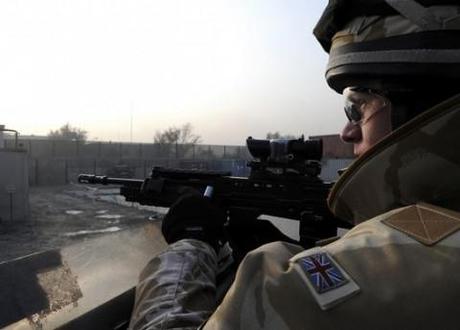
The British army is set to shrink to its smallest size in over a century. Defence Secretary Dr Liam Fox has announced cuts that, in concert with last year’s defence review, will see the number of troops reduced from 101,000 to around 82,000 by 2020. As a sweetener to the armed forces – after all, they’re the ones with the guns – Fox also announced an increase in the army’s equipment budget of around £3 billion, although not until 2015-2020. Most attention has focused on the expanded role of the Territorial Army (TA) and related reserves: Fox said he intended numbers of army, navy and airforce trained reservists to increase by 16,000.
The US Army is made up of 38% reservists. Source: BBC.
- Looking to the US. Under Dr Fox’s plans, the TA will make up 30% of the army by 2020. According to the BBC, this will bring the British Army closer to the American model: in the US, reservists from the National Guard and the US Army Reserve currently make up 38% of the army. However, Mark Phillips of the Royal United Services Institute told the BBC that there is a key difference: while TA reservists are part-time, approximately half of US reserves are full-time. There is also the issue of attracting new reservists: Dr Fox estimated that the reservist recruitment drive would cost around £1.5 billion.
“Reservists are an augmentation to permanent forces; they should not be an alternative.” The Times.
- Dad’s Army? Probably best not to use this phrase in front of Liam Fox: “It’s a little offensive when we’ve used the reserves so successfully in Afghanistan to talk about them as Dad’s Army,” he told Sky News. Not everyone is convinced that reservists can plug the gap. While acknowledging that reservists can play a useful part in conflict, a Times editorial vehemently opposed the idea that they could replace professional soldiers: “Reservists are an augmentation to permanent forces; they should not be an alternative…. At a time when Britain is embroiled in a war and another conflict that could feasibly become one, the notion of sweeping cuts to military personnel, to try to reduce costs, is both foolish and perverse.” Over at The Telegraph, Con Coughlin was similarly disconcerted: “Part-time soldiers rarely acquire the same skills set as those who sign up for a full-time commitment.” Coughlin puts the announcement in the context of the handover of Afghanistan: “It is because of the Government’s deep aversion to the Afghan commitment that it this week announced radical plans to restructure the Army.”
Size of armed forces by country: France, 238,000; Germany, 251,000. China currently has the largest military, followed by the US, India and North Korea. Source: The Economist.
- Bad for morale? Writing in The Guardian, Michael White questioned the effect of the announcement on the troops that survive the cuts: “Military-minded MPs, Tory and Labour, told me yesterday that below 100,000 it becomes harder to sustain important logistical functions, military intelligence and even military police. It also shrinks the talent pool for recruitment to special forces (SAS, SBS etc), one pointed out. There will also be army redundancies, which are as bad for morale as in any other trade.”
The army has become “remote” from the general public.
- Community service. Some commentators have suggested that the increased emphasis on reserves will improve the relationship between armed forces and civilians. According to the Future Reserves report, the army has become “remote” from the general public; the increased use of reservists will “offer a conduit for representing Defence interests”. Anyone else think that sounds a bit sinister?
- The Sun speaks. The Sun, soi-disant paper of the armed forces, ran the story under the headline “Kick in barracks for Army heroes“.
- Who’s next? The police are bracing for impact: the Inspectorate of Constabulary has published a report that claims one in eight police jobs will go thanks to the spending cuts.
More on finance
- No end in debt ceiling debate
- The UK needs to get positive
- Greek debt package unveiled
- Penile length linked to GDP growth
- Is there a future for the Euro?

